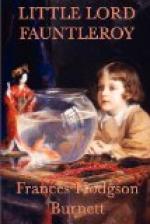As to Earl’s Court, it was a disgrace, with its dilapidated houses and miserable, careless, sickly people. When first Mrs. Errol went to the place, it made her shudder. Such ugliness and slovenliness and want seemed worse in a country place than in a city. It seemed as if there it might be helped. And as she looked at the squalid, uncared-for children growing up in the midst of vice and brutal indifference, she thought of her own little boy spending his days in the great, splendid castle, guarded and served like a young prince, having no wish ungratified, and knowing nothing but luxury and ease and beauty. And a bold thought came in her wise little mother-heart. Gradually she had begun to see, as had others, that it had been her boy’s good fortune to please the Earl very much, and that he would scarcely be likely to be denied anything for which he expressed a desire.
“The Earl would give him anything,” she said to Mr. Mordaunt. “He would indulge his every whim. Why should not that indulgence be used for the good of others? It is for me to see that this shall come to pass.”
She knew she could trust the kind, childish heart; so she told the little fellow the story of Earl’s Court, feeling sure that he would speak of it to his grandfather, and hoping that some good results would follow.
And strange as it appeared to every one, good results did follow.
The fact was that the strongest power to influence the Earl was his grandson’s perfect confidence in him—the fact that Cedric always believed that his grandfather was going to do what was right and generous. He could not quite make up his mind to let him discover that he had no inclination to be generous at all, and that he wanted his own way on all occasions, whether it was right or wrong. It was such a novelty to be regarded with admiration as a benefactor of the entire human race, and the soul of nobility, that he did not enjoy the idea of looking into the affectionate brown eyes, and saying: “I am a violent, selfish old rascal; I never did a generous thing in my life, and I don’t care about Earl’s Court or the poor people”—or something which would amount to the same thing. He actually had learned to be fond enough of that small boy with the mop of yellow love-locks, to feel that he himself would prefer to be guilty of an amiable action now and then. And so—though he laughed at himself—after some reflection, he sent for Newick, and had quite a long interview with him on the subject of the Court, and it was decided that the wretched hovels should be pulled down and new houses should be built.
“It is Lord Fauntleroy who insists on it,” he said dryly; “he thinks it will improve the property. You can tell the tenants that it’s his idea.” And he looked down at his small lordship, who was lying on the hearth-rug playing with Dougal. The great dog was the lad’s constant companion, and followed him about everywhere, stalking solemnly after him when he walked, and trotting majestically behind when he rode or drove.




